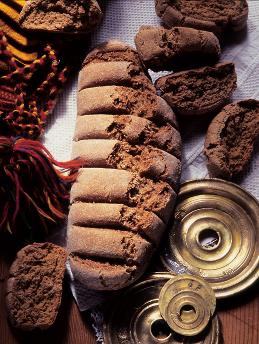

|
History |

|
TEAM OF CRETAN PAXIMADI PRODUCERS |

|
Paximadi or dipyrites artos (twice baked bread) of ancient times has marked the nutritional civilization of the Greeks, sometimes as a staple and at other times as a luxury food product. Those who have studied the great Minoan civilization maintain that the Cretans of the second millennium B.C. included paximadi in their diet. Most written texts referring to this kind of bread date back to the historical times. The Byzantines believed that it was the creation of great gastronome, Paxamos, who lived in the Roman period. It is not known, however, whether and how he contributed to the evolution of bakery. According to available historical information, paximadi became a trademark of the Cretan Diet, particularly of the rural population and is one of its indispensable ingredients. It was the bread of the farmers, the shepherds and the sailors of Crete and effective production techniques were developed because it covered the social requirements of the island for many centuries. It can be preserved for long periods of time without loss of quality and for this reason it was established as the daily bread of families that could not bake on a regular basis. The shepherds and sailors who were forced to leave their homes for long periods of time provided themselves with paximadi. In order to cover the sailors’ needs the city bakeries of Crete produced top quality paximadi even at the time of the Venetian occupation as we are informed from written sources of the 16th century. As a result, Cretan paximadi can be considered as one of the most ancient “standardized” food products. The various travelers that visited the island during the period of the Turkish occupation refer to the Cretans’ special relationship with paximadi which was consumed on a daily basis. The production techniques are an excellent mixture of folk knowledge as it has been maintained by the women of Crete and professional work. Cretan paximadi is a valuable secret of health as well as an important element of our gastronomic heritage. Bread of the poor, the shepherds, the farmers and the sailors, paximadi may have encountered many contradicting ups and downs; in some cases it was regarded as the bread of luxury and in other cases, as the bread of need. Yet, it conveys through time the rich experience and wisdom of the people who invented it and produce it. |


